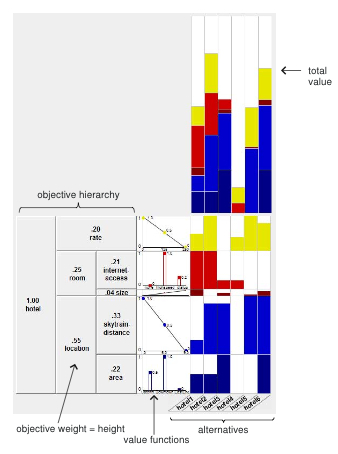Empirical Evaluation of Interactive Visualizations for Preferential Choice
An Empirical Evaluation of Interactive Visualizations for Preferential Choice by Jeanette Bautista and Giuseppe Carenini
UNDER CONSTRUCTION
Short Description
The authors of this paper tried to not only show the usefulness of Value Charts to support preferential choice, which is finding the best option out of a set of alternatives. Furthermore, they compared two types of Value Charts: a horizontal version against a vertical version. The outcome of this extensive user study was that Value Charts in general and in particular Vertical Value Charts (abbreviated VC+V) seemed to be very effective in supporting decision making.
Process of decision making
The process of effective preferential choice can be divided into 3 steps according to prescriptive decision theory.
Step 1 / Model construction phase: the decision maker (abbr. DM) finds objectives, which are important to him/her. The degree of importance is also chosen.
Step 2 / Inspection phase: DM analyzes his/her preference model as applied to a set of alternatives.
Step 3 / Sensitivity analysis: DM is able to answer "what if" questions - such as "if we make a slight change in one or more aspects of the model, does it effect the optimal decision?"
ValueCharts+
Part A: Controlled Study
Part B: User Study
Datasets
Figures
Shown above is the horizontal version of a ValueChart+ presented by Bautista et Carenini
Shown above is the vertical version of a ValueChart+ presented by Bautista et Carenini
Important Citation(s)
Suitable for which data types
Evaluation(s)
References
An empirical evaluation of interactive visualizations for preferential choice

